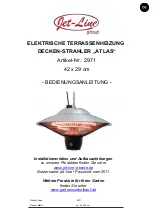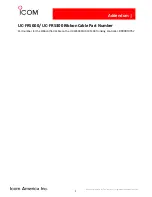
8
-- If a leak is detected, check the components
involved for cleanliness in the thread areas
and proper application of pipe compound
before further tightening.
-- Tighten the gas connection as necessary to
stop the leak.
-- If necessary, replace the parts or components
involved if the leak cannot be stopped.
-- Ensure all gas leaks have been identified and
repaired before proceeding.
9. A qualified service agency must check for proper
operating gas pressures upon installation of the
heaters.
10. Use the proper gas supply line to assure proper
functioning of the heaters. Typically, 3/4 in. ID black
iron pipe is used to supply gas to the inlet of the zone
control panel with 1/2 in. ID black iron pipe used to
convey the gas to the heaters. However, always
consult your fuel gas supplier, or the L. B. White Co.,
Inc. for proper line sizing and installation.
11. Infraconic heaters require a regulated gas supply to
the gas inlet. Exceeding the gas inlet pressure rating
can result in poor performance and unreliable
operation. Refer to page 4 of this manual for
information on gas pressures relating to specific
models.
12. The heater is designed for either L.P. vapor with-
drawal or natural gas, depending on model number.
Do not use this heater in an LPG liquid withdrawal
system. Do not permit LPG in liquid form to enter the
heater at any time.
13. The corrosive atmosphere present in animal
confinement buildings can cause component failure
or heater malfunction. The heater should be
periodically inspected and cleaned in accordance
with the Maintenance and Cleaning Instructions in
this manual. Make sure that livestock is protected by
a back up alarm system that limits high and low
temperatures and also activates appropriate alarms.
14. Take time to understand how to operate and
maintain the heater using the owner’s manual. Make
sure you know how to shut off the gas supply to the
building and to the individual heaters. Contact your
gas supplier if you have any questions.
15. Any defects found in performing any of the service
procedures must be eliminated and defective parts
replaced immediately. Retest the heater before
placing it back into service.
INSTALLATION LAYOUT
FOR SAFE CLEARANCES
I17 & I34 - 3 FT. MINIMUM
BROODER TOP TO CEILING
POSITION THE GAS HOSE AND ELECTRICAL POWER CORD
OUTSIDE OF THE HOT ZONE DIRECTLY ABOVE THE HEATER.
POSITION THE GAS HOSE AND POWER CORD TO AVOID
ANY OPPORTUNITY FOR CONTACT WITH THE HOT CANOPY
SURFACE OF THE HEATER.
MINIMUM 3 FT. CLEARANCE
TO COMBUSTIBLES
FLOOR
I17 - 3.5 FT. MINIMUM
I34 - 4.5 FT. MINIMUM
POINT OF COMBUSTION
CONE TO FLOOR
HANG THE HEATER WITH THE
CONTROL END 1 TO 5 DEGREES DOWN
FROM HORIZONTAL (SEE BELOW)
CONTROL PANEL
GAS PIPING
FIG. 2
3 FT. MINIMUM
BROODER TOP TO CEILING
4.5 FT. MINIMUM
POINT OF COMBUSTION
CONE TO FLOOR
POSITION THE GAS HOSE OUTSIDE OF THE HOT ZONE
DIRECTLY ABOVE THE HEATER. POSITION THE GAS HOSE TO
AVOID ANY OPPORTUNITY FOR CONTACT WITH THE HOT
CANOPY SURFACE OF THE HEATER.
AATTTTEEN
NTTIIO
ON
N
■
Model I40 heaters use an
integral hanging bracket with
key ring for hanging the heater.
■
Attach only steel cable or chain
to the key ring. Do not use
combustible hanging materials
such as ropes, lines, etc.
■
The installer must make sure
that the heater is hung so
control end of heater is
positioned 1º to 5º down from
horizontal after gas supply hose
is attached.This allows proper
venting of heater and eliminates
potential heat damage to
optional dust filter.
■
Repositioning of factory installed
key ring into hanging bracket
may be required.
■
Refer to following illustrations.
THIS
NOT THIS
CONTROL END
KEYRING
STEEL CABLE
HANGING
CONTROL END
OR CHAIN
BRACKET
OF HEATER
MUST BE 1 TO 5 DOWN
FROM HORIZONTAL









































